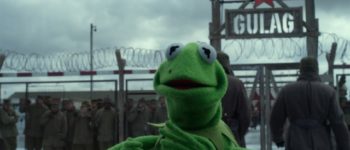1944: Little Poland
October 30, 2019
By AHNZ
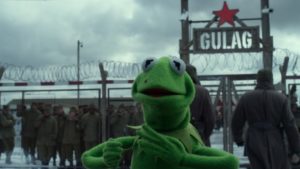 Today in New Zealand history, 31 October 1944, a boatload of Polish refugees (mainly children) arrived at Wellington. The rescue kids had been displaced by the Soviets after the conquest of Germany and were likely due for a life in the Gulag Archipelago. Their homeland had been seized by National Socialists (Nazi Germany,) prompting World War II. Now it was invaded again- by Communists (Soviet Russia.) Or, in other words, liberated by our allies.
Today in New Zealand history, 31 October 1944, a boatload of Polish refugees (mainly children) arrived at Wellington. The rescue kids had been displaced by the Soviets after the conquest of Germany and were likely due for a life in the Gulag Archipelago. Their homeland had been seized by National Socialists (Nazi Germany,) prompting World War II. Now it was invaded again- by Communists (Soviet Russia.) Or, in other words, liberated by our allies.
So this was what winning looked like. Congratulations kids.
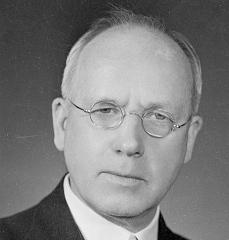 The following day, 1 November, Prime Minister Peter Fraser soaked up rays of good PR as his scheme came to fruition. The rescue kids were cheered by New Zealanders as their two trains passed the towns on the way to the prisoner of war camp at Pahiatua. This train trip was certainly a major PR exercise. Was it contrived or spontaneous? Knowing Labour 1.0 as I do it’s hard to imagine anything they do in public was not stage-managed.
The following day, 1 November, Prime Minister Peter Fraser soaked up rays of good PR as his scheme came to fruition. The rescue kids were cheered by New Zealanders as their two trains passed the towns on the way to the prisoner of war camp at Pahiatua. This train trip was certainly a major PR exercise. Was it contrived or spontaneous? Knowing Labour 1.0 as I do it’s hard to imagine anything they do in public was not stage-managed.
“An estimated 1.7 million Poles were deported to labour camps in Siberia following the Soviet occupation of eastern Poland in 1939. Germany’s invasion of the Soviet Union in 1941 prompted Joseph Stalin to send over 120,000 Polish prisoners to Iran, where they languished in refugee camps.”- NZHistory.gov
So, the Rescue Kids were pawns in Fraser’s campaign to be revered the way his predecessor, Savage, was loved. To that government the Communist Russkies were our good friends. The orphaned children were not integrated into New Zealand society, they were not welcomed to live with us. That was not the plan. The 734 children and 103 adults were installed under military control in a prison camp built in 1942 to house the enemy¹. Here they would remain until 1949.
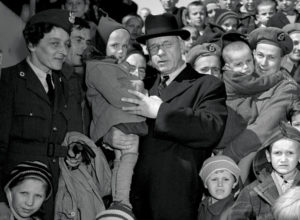 Nor were the inmates educated to be New Zealanders, they continued to be taught in Polish with the intention of sending them back to Europe again. Seems to me these Poles had simply escaped a Soviet gulag to have ended up in a New Zealand one. The main difference, we may suppose, is that Gulag NZ had more humane living conditions. That being said, the army commandant in charge was later criminally charged with a very great theft so perhaps corruption was not so unknown.
Nor were the inmates educated to be New Zealanders, they continued to be taught in Polish with the intention of sending them back to Europe again. Seems to me these Poles had simply escaped a Soviet gulag to have ended up in a New Zealand one. The main difference, we may suppose, is that Gulag NZ had more humane living conditions. That being said, the army commandant in charge was later criminally charged with a very great theft so perhaps corruption was not so unknown.
In the end most of the inmates were liberated and became New Zealanders. From being a down-and-out orphan in post-war Iran to catching this lucky break to New Zealand must have been a huge boost to their life outcomes. I bet these Kiwi Poles think about that often, how easily their life path could have gone another way like so many others. They have a political whim to thank for it, as the wife of the NZ Polish Consul and Peter Fraser’s wife used their influence with the PM to make this drop-in-the-ocean gesture.
Thanks to the opportunity to look good using political power something good happened for once. However, we needn’t think that The State is benevolent and the friend of displaced orphans the way Statist history records. The Pahiatua Polish children are used to this day to flatter Fraser and The State, a way of saying how great “we” are. If you like looking at it that way you’d better not look deeper into the real causes: “If you like laws and sausages, you should never watch either one being made,” said Bismarck.
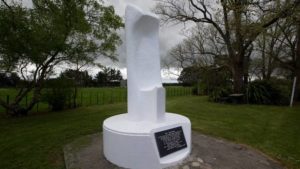
Of the camp, nothing remains. In 1975 a pretty ridiculous-looking monument was erected to remember the benevolent State’s rescue gulag. Apparently the shadow it casts at mid-day looks something like a mother holding a child. Perhaps that’s a fitting memorial to what really happened.
Like a stuck clock, even the State does something right once in a while, by accident, when the conditions are just right. The rest of the time it’s just a giant ugly trick pointing in the air.
—
1 Ref. New Zealand’s First Refugees: Pahiatua’s Polish Children; NZETC
Image ref. Polish refugees land in New Zealand; nzhistory.govt
Image ref. Monument to the camp; NZ Herald
 Like Comment Share
Like Comment Share

